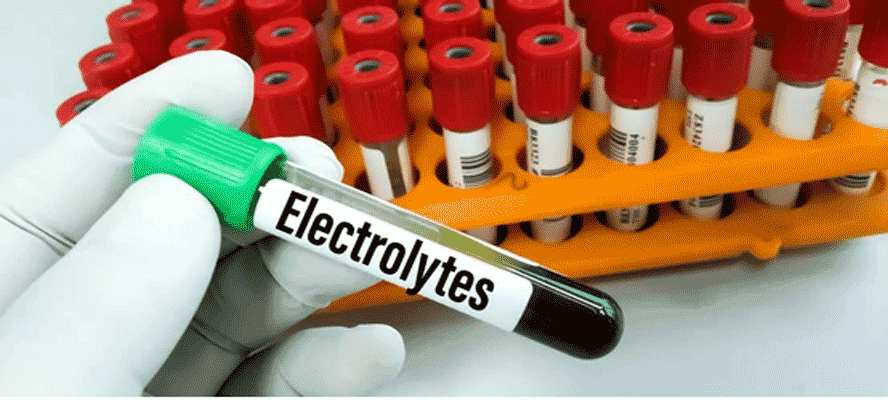Do you know your body cells talk with each other?
Yes, you read it right. Our body is made of cells. These cells need to communicate with each other to function properly. The cells in our body take the help of Electrolytes.
Electrolytes are famously known as minerals. These compounds break down into ions when dissolved in water which is why they carry positive and negative charges in the solution and this quality makes them capable to conduct electrical charges from one place to another.
Sodium, magnesium, potassium, calcium, chloride, and phosphate are the electrolytes that we need for our day-to-day activities. These are also called serum electrolytes as they are present in the serum. We get all these electrolytes from the food and water we consume every day.
Electrolytes are vital for our bodies. They play a key role in maintaining the proper functions of our bodies. Some of the functions are as follows:
- It maintains the pH of our blood.
- It is necessary for muscle contraction.
- It helps in heartbeat.
- It helps to maintain the balance of fluids inside and outside the cells.
- It helps in the transmission of nerve signals from muscles, heart, and nerve cells to other cells in our bodies.
- It is used in the diagnosis of diseases and medical conditions like dehydration, kidney disease, heart disease, etc.
We have known some of the functions of electrolytes here. But the imbalances of electrolytes cause various medical conditions like hypercalcemia, hypochloremia, hyperkalemia, etc.
Now, you may be wondering how can I stay away from such medical conditions. To stay away from medical conditions we have a diagnostic test named Serum Electrolytes Test.
Stay tuned with me as I will explain to you the following points in detail that help you understand about electrolytes serum test.
- Electrolytes Test – Overview
- Why Should You Undergo a Serum Electrolytes Test?
- How to interpret the Serum Electrolyte test results?
- All you need to know about the serum electrolyte test price
- How HealthcareOnTime can help?
Electrolytes Test – Overview
The electrolyte test is a blood test used by medical professionals to know the levels of electrolytes in the body. It helps them to determine if there is an electrolyte imbalance in the body.
Other common names of electrolyte tests are:
- Electrolyte panel
- Electrolyte blood test
- Electrolyte lab test
- Serum electrolyte test
There are other tests that your doctors might recommend to give you the best treatments as follows:
Basic Metabolic Panel:
A basic metabolic panel tests is used to know different processes in our body and uses the BUN (blood urea nitrogen) test to check the functioning of the kidneys and if abnormal results come then it may indicate dehydration.
Comprehensive Metabolic Panel:
This test is used in addition to the basic metabolic panel test to know the levels of calcium, albumin, total blood protein, bilirubin, aspartate aminotransferase, and alanine aminotransferase.
Other tests:
- Aldosterone blood test-This test searches for a specific hormone produced by your kidneys and the results can indicate certain types of electrolyte problems.
- Aldosterone 24-hour urine test-This test looks for aldosterone by using several urine samples collected during a 24-hour timeframe.
- Anion gap blood test-The test is used to compare the levels of specific electrolytes to see if there’s a difference between the measured levels of positive-charge and negative-charge electrolytes, which may be a sign of certain medical conditions.
- Antidiuretic hormone test (blood)-This test looks for an antidiuretic hormone that helps rule out certain medical conditions that share symptoms — especially excessive thirst or fluid imbalance — with electrolyte-based conditions.
- The carbon dioxide blood test-This test measures the concentration of carbon dioxide in your blood that tells whether your blood is too acidic or too basic.
- Chloride blood test– This test analyzes the level of chloride found in your blood.
- A chloride urine test-This test measures the amount of chloride in a urine sample. In a few cases, it can involve several samples taken over 24 hours.
- A magnesium blood test-This test measures the levels of magnesium in your blood.
- The blood osmolality test-This test measures the number of certain substances in your body. It’s commonly used in cases where you’re dehydrated, overhydrated, or when poisoning is possible or suspected.
- Urine osmolality test– This test is used to check the fluid balance, especially with changes in how often you need to pee. Urine osmolality tests use a “clean-catch” method that requires the sample is completely free from microbes.
- Phosphorus blood test-This test measures the level of phosphorus in your blood.
- A phosphorus urine test-This test analyses the amount of phosphorus that’s found in your urine. It may involve more than one sample taken over 24 hours.
- Sodium blood test– This test calculates the level of sodium in your blood.
- Sodium urine test– This test helps to measure the amount of sodium in your pee. It can involve multiple samples collected over 24 hours.
- Urine concentration test– This test shows healthcare providers how well your kidneys are functioning, especially their ability to manage the amount of fluid in your body. It looks specifically for the concentration of particles in your urine, electrolyte levels, and particle concentration (osmolality).
Why Should You Undergo a Serum Electrolytes Test?
You should undergo serum electrolytes tests for several reasons. Here, I am mentioning three big reasons-
- To know if you have electrolyte imbalance in your body: The test will give you confirmation if you have electrolyte imbalance or not as few symptoms might match with any other medical condition.
- To detect acid-base imbalance: It is also useful in finding whether you have an acid-base imbalance or not. Maintaining the acid-base balance in our body is vital otherwise we might suffer from a medical condition named acidosis.
- To detect kidney disease: It is used to evaluate kidney diseases. An electrolytes test measures the levels of various electrolytes in our body and gives us the status of our hydration hence it helps detect various kidney diseases like kidney stones.
- To know if your medicines are putting you at risk of electrolyte imbalance: Certain medicines affect electrolyte imbalance. These are antibiotics, chemotherapy drugs, corticosteroids, diuretics, and laxatives. If you are under these medicines then you must evaluate your electrolyte levels.
- Certain medical conditions can risk electrolyte imbalance: Certain medical issues can throw off the body’s electrolyte levels. These conditions include burns, cancer, cardiovascular disease, heart failure or high blood pressure, dehydration due to not drinking enough liquids or from excessive vomiting, diarrhea, sweating (hyperhidrosis) or fever, overhydration or water intoxication (drinking too much water), eating disorders, kidney disease, liver diseases like cirrhosis and substance use disorder.
How to interpret the Serum Electrolyte test results?
Before interpreting the test results one must know the normal range of the electrolytes.
|
Electrolytes |
Normal Range (millimoles per litre) |
|
Sodium |
136-144 |
|
Potassium Serum Whole Blood |
3.7-5.1 3.5-5 |
|
Chloride |
97-105 |
|
Bicarbonate |
22-30 |
|
Calcium Total Ionized |
2.12-2.54 1.08-1.30 |
|
Magnesium Serum Red Blood Cell Blood Gas Test |
0.7-0.95 1.65-2.67 0.43-0.66 |
|
Phosphate |
0.87-1.55 |
If your test results value deviates from the normal range of these electrolytes that indicates your body has electrolyte imbalance.
Sodium (Na+)
Hyponatremia: Below 135 mmol/L
Hypernatremia: Above 145 mmol/L
Hyponatremia or low blood sodium: It indicates that sodium concentration lies below the normal range.
Hypernatremia or high blood sodium: It indicates that sodium concentration lies above the normal range.
Potassium (K+)
Hypokalemia: Below 3.5mmol/L (Less than 136.5?g/ml approx.)
Hyperkalemia: Above 5.0mmol/L (Above 195?g/ml approx.)
Hypokalemia or low blood potassium: It indicates that potassium concentration lies below the normal range.
Hyperkalemia or high blood potassium: It indicates that potassium concentration lies above the normal range.
Chloride (Cl-)
Hypochloremia is a medical issue where your chlorine level decreases below the normal range.
All you need to know about the serum electrolyte test price
Serum electrolytes test price depends on the location and the pathology lab or diagnostic centre. Also, if you want to go for an electrolyte test at home then also the serum electrolytes test price will differ.
So, we must do proper research about the diagnostic centers present at your locations.
Well, I can help you to find the best diagnostic center. I know a diagnostic center that is spread across the country and it’s named HealthcareOnTime.
Now you must be wondering why I recommended Healthcare OnTime among other diagnostic centers. Please read my next point to know the answer.
How HealthcareOnTime can help?
HealthcareOnTime is the leading diagnostic center in India that has NABL, ISO, and CAP-certified labs. It has also partnered with Thyrocare to provide quality healthcare facilities at your doorstep.
HealthcareOnTime has numerous health packages to choose from that are affordable. The prices of various health packages are almost half of their counterparts.
They provide lab reports within 48 hours of sample collection via email which is the best thing as we don’t have to visit the lab again and it saves our time.
Also, the lab reports are accurate as the tests are performed by qualified healthcare providers in their CAP-accredited labs.
HealthcareOnTime provides 24/7 online and phone booking facilities, thus giving us the freedom to avail of any test services at any time and anywhere. You can clear your queries on their Facebook page and also by calling them by using their phone booking facilities.
So, what are you waiting for grab your mobile phones and book your appointment if you have the following symptoms.
- Confusion and irritability.
- Diarrhea or constipation.
- Irregular or fast heart rate (arrhythmia).
- Muscle cramps, muscle spasms, or weakness.
- Nausea and vomiting.
- Numbness in limbs, fingers, and toes.
As these symptoms can cause devastating effects on your body. Therefore, book your appointment at Healthcare OnTime and enjoy their service.








